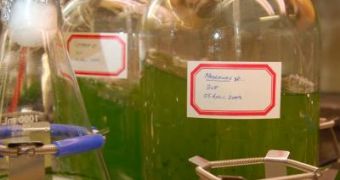Over the past few years, a lot of time, money and effort have been directed towards making algae a viable source of alternative fuels, on account of the fact that some people are really interested in combating global warming and in offering the world replacements for coal, oil and natural gas. However, the amounts of alternative fuel that can be extracted from plants at this point are limited by the fact that the oil can only be processed if the plant is destroyed in the process. Now, nanofarming technology could provide algae processors around the world with a very effective way of doing just that.
The new methods involve the use of mesoporous nanoparticles, which extract the oil for processing from the living plants, without the need of the latter being destroyed in the process. This would basically considerably reduce the costs associated with this industry and also provide a boost for those seeking to enter it. The sponge-like materials are capable of collecting only small amounts of oil, but their numbers will be very large. Once the collection process is completed, a catalyst will be used to produce the biodiesel.
In charge of this research is a joint venture between the Ames Laboratory, a subsidiary of the US Department of Energy (DOE) and the Iowa State University. The Ames facilities collaborate with nanotechnology company Catilin for the commercialization of the innovation, under a contract known as the Cooperative Research and Development Agreement. The Office of Energy Efficiency and Renewable Energy, belonging to the DOE, is funding the three-year project, with a total sum of roughly $885,000.
“By combining nanotechnology, chemistry and catalysis, we have been able to find solutions that have not been considered to date. Ames Laboratory and Iowa State University offer valuable research capabilities and resources that will play a key role in this exciting collaboration with Catilin,” Victor Lin, the Chemical and Biological Science program director at the Ames Laboratory, said. “When we ultimately put together this exceptional extraction technology with Catilin's existing solid biodiesel catalyst, we will dramatically increase the reality of renewable energy. Given the Obama administration's objectives, the timing is perfect,” Larry Lenhart, who is the CEO at Caitlin, concluded.

 14 DAY TRIAL //
14 DAY TRIAL //